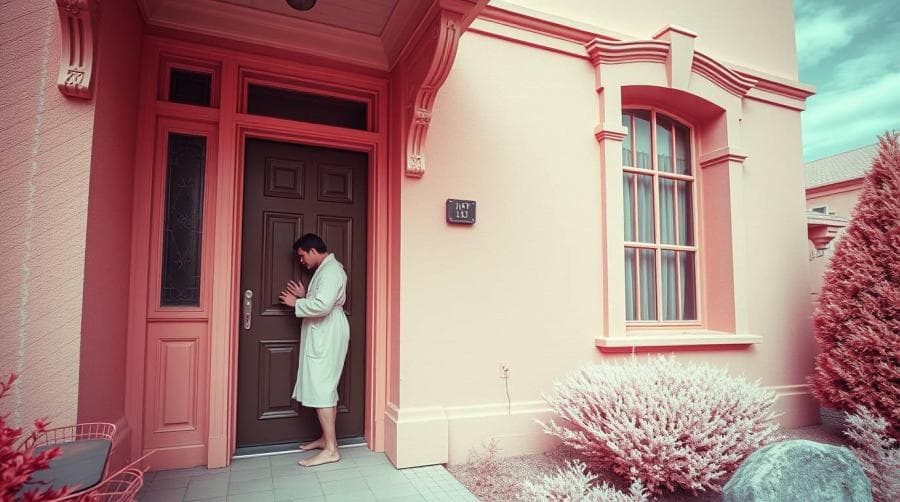What to Do When You're Locked Out of Your Home in South Africa: A Step-by-Step Guide

Being locked out of your home is a stressful situation that most South Africans will experience at least once. Whether you've lost your keys, left them inside, or have a malfunctioning lock, this comprehensive guide will help you navigate this challenging situation safely and efficiently.
Step 1: Stay Calm and Assess the Situation
The first and most important step is to remain calm. Panic can lead to poor decision-making. Take a deep breath and assess your situation:
- Are you in a safe location? If it's late at night, consider waiting in your car or at a neighbor's house.
- Is there an emergency (e.g., something cooking on the stove, a child left inside)? If yes, call emergency services immediately.
- Do you have access to your phone, wallet, or ID? This will be important when verifying your identity to a locksmith.
Step 2: Check for Alternative Entry Points
Before calling a locksmith, check if there's another way to safely enter your property:
- Is there an unlocked door or window? (Always ensure you secure these afterward for better home security)
- Did you give a spare key to a trusted neighbor, friend, or family member?
- If you rent, does your landlord or building manager have access?
Safety Warning: Never attempt to break into your own home by forcing doors or windows. This can result in property damage, injury, and potential police intervention, especially in South African neighborhoods with active security companies or community watch programs.
Step 3: Find a Reputable Emergency Locksmith
If you can't gain entry through alternative means, it's time to call a professional locksmith. In South Africa, follow these steps to find a reliable service:
- Search for locksmiths in your area. Use our locksmith directory to find pre-vetted professionals near you. Filter for those offering emergency services.
- Verify their credentials. Ask if they're registered with the Private Security Industry Regulatory Authority (PSIRA) or the Locksmith Association of South Africa (LASA).
- Request a price estimate. Be aware that emergency calls, especially after hours, will cost more. Ask for a breakdown of charges.
- Confirm their arrival time. In urban areas like Johannesburg, Cape Town, or Durban, expect 30-60 minutes. Rural areas may take longer.
Step 4: Prepare for the Locksmith's Arrival
While waiting for the locksmith to arrive, prepare the following:
- Proof of residence or ownership. This could be an ID book/card showing your address, utility bill, lease agreement, or property title.
- Payment method. Most South African locksmiths accept cash, and some take card payments or EFTs.
- Phone with sufficient battery. You may need it for identification verification, payment, or further communication.
Typical Costs for Emergency Locksmith Services in South Africa
Understanding the costs involved will help you prepare and avoid surprises. Here's what you can expect to pay in South Africa as of 2023:
| Service | Business Hours Cost (R) | After Hours Cost (R) |
|---|---|---|
| Standard Lockout (No damage to lock) | R350 - R600 | R700 - R1200 |
| Lock Replacement (If needed) | R450 - R900+ | R750 - R1500+ |
| Call-Out Fee (Often included in service) | R250 - R350 | R400 - R600 |
Note: Prices vary by location, locksmith, and complexity of the lock. Urban areas like Johannesburg, Cape Town, and Pretoria generally have more competitive pricing due to higher competition.
Step 5: Verifying Your Identity
A professional locksmith will ask for proof that you live at or own the property. This is a security measure to prevent assisting with illegal entry. Be prepared to:
- Show your ID with an address matching the property
- Provide utility bills or other documents proving residence
- If your documentation doesn't match the address, you might need to contact your landlord or provide additional verification
Step 6: After Regaining Entry
Once you're back inside your home:
- Consider having spare keys made immediately
- Store a spare key with a trusted person or in a secure lock box
- If your lock was damaged during entry, arrange for repairs or replacement
- Review your overall home security situation
Preventive Measures for the Future
To avoid future lockouts, consider these preventive strategies:
- Hide a spare key securely. Avoid obvious hiding spots like under doormats or potted plants.
- Give a spare to a trusted neighbor or nearby family member.
- Install a digital lock with keypad access as a backup to traditional keys.
- Keep a spare key in your wallet (separate from your main keys) or at your workplace.
- Consider a key tracking device that connects to your smartphone.
Need an Emergency Locksmith Now?
Browse our directory of verified emergency locksmiths across South Africa.
Find a LocksmithWhen to Consider Upgrading Your Locks
A lockout situation might be a good time to assess your current locks. Consider an upgrade if:
- Your current locks are outdated or showing signs of wear
- You've recently moved into a new home
- You've experienced a break-in attempt
- You're using standard locks in a high-crime area
South African security experts often recommend deadbolts, security gates, and smart locks for enhanced home protection, especially in areas with higher crime rates.
Conclusion
Being locked out is frustrating, but with the right approach, you can resolve the situation quickly and safely. Remember that reputable locksmiths in South Africa are trained professionals who can help you regain entry with minimal damage and provide valuable advice on improving your home's security.
By following the steps in this guide, you'll be prepared to handle a lockout efficiently and potentially use the experience as an opportunity to enhance your overall home security.